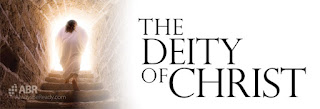Chapter 11

In Chapter 11 of his Systematic Theology, Pannenberg, in the third part of his discussion of Christology, will explore the reconciliation of the world. He will discuss, within the context of anthropology and creation, what God has done to reconcile the world in Christ. The parallel in Karl Barth is Church Dogmatics, IV.1. Pannenberg is among the theologians who want to move away from the central place the crucifixion holds in other theological systems. Christ did fully accomplish our salvation at Golgotha. Yet, salvation has an orientation toward the Spirit and eschatology that such a cross-centered theology would not allow. Moltmann shares in this orientation, moving toward an eschatological Christology. [1] I should also say that he finally discusses the gospel as the close of his discussion of Christology and reconciliation of the world. This contrasts with Barth, of course, who discusses the Word of God, especially its three-fold form, in Chapter I as part of
